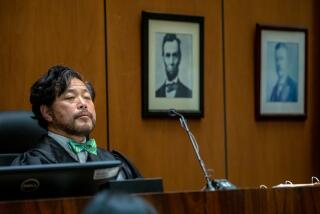Carona’s lawyers want tapes tossed out
- Share via
Stepping up their defense of former Orange County Sheriff Michael S. Carona, attorneys on Friday asked a federal judge to exclude as evidence secret recordings of conversations between a top aide and Carona in the weeks before he was indicted on corruption charges.
One of the seven charges against Carona alleges that he tried to persuade Donald Haidl, his former assistant sheriff and close friend, to withhold information from a federal grand jury. The charge stems from conversations Haidl secretly recorded during three meetings with Carona last year.
The defense contends that federal lawyers improperly sent Haidl to meet with Carona while the former sheriff was represented by attorneys. Ethical guidelines governing California lawyers prohibit them from communicating directly or indirectly with parties represented by legal counsel, Carona’s attorneys contend.
U.S. District Judge Andrew J. Guilford will be asked to decide whether the government can get around that restriction by sending a third party, not employed by authorities, to communicate with a represented suspect.
Prosecutors declined to comment on the matter, saying they intended to file a response within two weeks. A hearing on the motion is scheduled for Feb. 29.
Experts in federal criminal law said courts have been reluctant to grant similar defense motions and that Carona’s lawyers face an uphill battle trying to have the recordings excluded.
“That’s what ‘cooperatives’ do, they record conversations. It’s a time-honored tactic,” said Mark J. Werksman, a Los Angeles criminal-defense attorney and former federal prosecutor. He said he had not read the Carona motion.
“If this motion were to prevail,” he said, “it would mean if you get a lawyer then the government can’t get an undercover to speak to you and surreptitiously record the conversation.”
Although lawyers are prohibited from contacting parties who have counsel, courts have been reluctant to throw out admissions made in similar circumstances, echoed Loyola Law School professor Laurie Levenson, also a former federal prosecutor.
“There’s only been one court that’s ever gone their way,” she said. “The problem is there have been plenty of courts that have declined to make that ruling. This is a significant motion not just for this case, but frankly for how it could impact other government investigations.”
Carona’s attorneys contend that the prosecution overstepped its authority by providing Haidl two sham subpoenas that he showed Carona during a meeting in August. That prompted a talk about how Haidl should deal with them, during which Carona allegedly encouraged him to be dishonest with a federal grand jury.
The 2nd U.S. Circuit Court of Appeals concluded that prosecutors committed “egregious misconduct” in a different case when they had an informant show a suspect a phony subpoena supplied by a prosecutor.
Based in part on that case, Carona’s lawyers say, the federal court should suppress any statements Carona made to Haidl during the meeting.
The motion illustrates the delicate line prosecution and defense attorneys were straddling in the weeks before Carona’s indictment. Haidl agreed in March to plead guilty to tax evasion charges and to cooperate against Carona even while lawyers for the two men continued to communicate.
In July, Carona lawyer H. Dean Steward contacted Haidl lawyer Mark Byrne and asked whether Haidl had secretly pleaded guilty.
“He told me that was not the case, that Haidl made no deal and that he had not pled guilty,” Steward wrote in a declaration.
Four days later, Haidl and Carona had the first of three conversations that Haidl secretly recorded for prosecutors.
Byrne said it was a difficult situation, but he had no choice but do what was best for Haidl.
“This situation arises often when a client who is cooperating with the government is asked to act in an undercover capacity,” Byrne said. “It can be awkward, but we have a duty to represent our client’s interest. There was no joint defense agreement here, and we did what we had to do to represent Don’s interest.”
More to Read
Sign up for Essential California
The most important California stories and recommendations in your inbox every morning.
You may occasionally receive promotional content from the Los Angeles Times.











